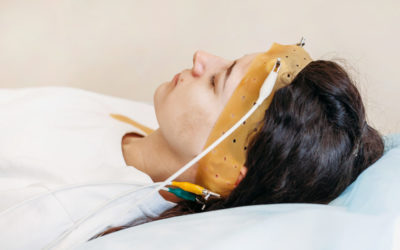Quick Hits
Daily brief research updates from the cognitive sciences

Imagine if you are working and your stress levels are increasing, and then automatically soothing music is turned on to calm you down. Or alternatively if you are heading towards that after lunch dip of drowsiness and upbeat energetic music is turned on to energise you.
This sounds like a sort of mind-reading device of the future, but this is a possibility according to Rose Faghih of NYU Tandon School of Engineering – and without having any invasive electrodes or implants in your brain but through a simple skin patch!
How so you may ask?
Well skin conductance is a well-known way to measure things like stress responses. Your skin reacts very quickly at microscopic levels to things like stress and mental disturbances. We’ve known that for a long time and skin conductance measure are often used in research – it is cheap, non-invasive, and a good measure of many things.
The really tricky thing through is being able to accurately predict these brain or mind states and match these to the biological data and additionally to be able to do this in real time. For this Faghih and her team have developed much more accurate ways of modelling skin responses by mapping this to 3D modelling of sweat glands and amongst other things, how they respond, how sweat distributes, is evaporated, or reabsorbed.
This has then been used to develop accurate algorithms (which though complex require little computing power) to instantaneously predict mental states in real time. This is amazing – it uses very detailed models of how the skin responds to various scenarios and has modelled this to be able to report instantaneously on mind states. Wow!
The uses of this are multifold – the above example of work will probably not be a prime focus (or maybe only in high-risk roles such as pilots). This could include identifying peripheral neuropathy in diabetes patients, post-traumatic stress disorders, on top of multiple uses in mental health monitoring.
This sounds promising, some of you may think that this could be abused by employers. It could be, but I imagine the most obvious uses will be key health issues – in the short term – and that is a good thing.

Andy Habermacher
Andy is author of leading brains Review, Neuroleadership, and multiple other books. He has been intensively involved in writing and research into neuroleadership and is considered one of Europe’s leading experts. He is also a well-known public speaker, speaking on the brain and human behaviour.
Andy is also a masters athlete (middle distance running) and competes regularly at international competitions (and holds a few national records in his age category).
Reference
Rafiul Amin, Rose T. Faghih.
Physiological characterization of electrodermal activity enables scalable near real-time autonomic nervous system activation inference.
PLOS Computational Biology, 2022; 18 (7): e1010275
DOI: 10.1371/journal.pcbi.1010275
More Quick Hits
Disagreements Improve Team Perception
We might assume that agreement would be high in high-performing teams – this study shows the opposite…
Brain Cells Adapt to Help You Stay Awake
Falling asleep is a funny thing – you don’t need to think about it when it happens but can cause many people who can’t incredibly frustration…
Dad Brain is Real
We know that mothers go through multiple physical and psychological changes after birth (and before) including change in brain structures but what about fresh fathers?
Mask-Wearing Makes You Better Behaved
This is a fascinating study that shows that wearing masks changes behaviour in subtle but important ways…
Coffee Can Help You Live Longer
Yes, that is good news for you (us) coffee drinkers. This supports plenty of more recent studies which have shown the health benefits of coffee…
Big Kids Die Earlier!
Before you panic – the conclusion in the title is based on research into mice not human beings – but there could potentially be some important insights for us human beings as well.






